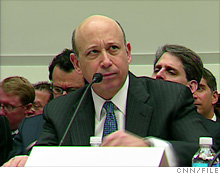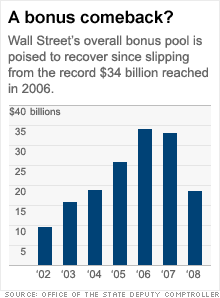Is a bonus tax in our future?
Though the United Kingdom's levy seems unlikely to spread to these shores, a bonus backlash could yet hammer U.S. banks.
 |
| Lloyd Blankfein's not taking a cash bonus, but that may not be enough to quiet bailout critics. |
 |
| Bonuses are making a comeback after a strong year for surviving financial firms. |
NEW YORK (Fortune) -- The odds aren't on its side, but a bonus tax could happen in the United States too.
The United Kingdom this week slapped a 50% tax on bankers' bonuses above about $40,000. The one-time tax will be paid by all banks with employees in the country. France pledged it would adopt the same policy, while Germany's chancellor called the idea "charming."
Still, the bonus tax seems like a long shot on this side of the Atlantic, where bankers wield immense power. But when Wall Street starts handing out giant year-end paychecks at a time of 10% unemployment, all the campaign donations in the world may not keep legislators facing tough re-election fights from turning on their banker chums.
We "could very well get a political backlash against the banks and bank bonuses during 2010," said Desmond Lachman, a resident fellow at the American Enterprise Institute in Washington. "This would be especially the case were the U.S. economy to stall, as I certainly expect it to once the positive effect of stimulus begins to fade."
The megabanks see this dynamic too. Goldman Sachs (GS, Fortune 500), the bank that stands to hand out the most obscene bonuses at year-end, has gone on a belated charm offensive.
Goldman said Thursday its top 30 executives, led by CEO Lloyd Blankfein, will forgo cash bonuses this year. The move comes on the heels of decisions at the New York-based firm to boost small business lending and donate more to charity.
Undercutting any good cheer, Blankfein told a British magazine last month the firm is "doing God's work," even as it rakes in billions of dollars in profits on trading.
"The bankers are so entitled, it's just astonishing," said Lee A. Sheppard, a tax attorney and contributing editor at the tax journal Tax Notes. "It only took them two years to wake up to the shame over this mess."
The main danger to this sense of entitlement comes from the House of Representatives. In March, it passed a bill that would have clawed back the bonuses paid at AIG (AIG, Fortune 500) through a 90% tax.
That measure received a frosty reception from the Obama administration and was shelved by the Senate. But if foreclosures and unemployment remain uncomfortably high, ideas like a bonus tax could gain steam, said Benn Steil, director of international economics at the Council on Foreign Relations in New York.
The House is "our most radical political institution," Steil said. "Some House legislation is deliberately provocative. It can be a good way for congressmen to grandstand."
Of course, even if the House passes a bonus tax, it would face an uphill battle in the Senate and with the administration. Unlike the United Kingdom, which faces an acute budget crisis, U.S. leaders seem to have some breathing room, despite the mounting deficit.
And if enacted, a bonus tax may or may not be effective in holding down runaway pay. Sheppard said the European bonus tax seems less likely to hold down bonuses than to punish bank shareholders who already foot outrageous bills for their trading and banking "talent."
Because the tax is to be paid by banks rather than by individuals, the end result may be that "the shareholders who stupidly failed to restrain the bankers from taking a huge share of the profits will get penalized again," Sheppard said.
There also is precedent for compensation limits unintentionally fueling the next phase of egregious pay.
In 1993, for instance, the Clinton administration capped the tax deductibility of executive salaries at $1 million -- prompting companies to shift compensation to deferred pay, stock options and bonuses. The tech bubble that popped almost a decade ago was fed in part by options-related abuses.
But past failures don't always resonate with lawmakers. And with bankers living it up at a time when people are getting thrown out of their houses in droves, concepts like bonus taxes may yet get some consideration.
"The banks have a lot of influence on the Hill, but there's a lot of anger on Main Street," said Steil. "It has to vent somewhere." ![]()
-
 The retail giant tops the Fortune 500 for the second year in a row. Who else made the list? More
The retail giant tops the Fortune 500 for the second year in a row. Who else made the list? More -
 This group of companies is all about social networking to connect with their customers. More
This group of companies is all about social networking to connect with their customers. More -
 The fight over the cholesterol medication is keeping a generic version from hitting the market. More
The fight over the cholesterol medication is keeping a generic version from hitting the market. More -
 Bin Laden may be dead, but the terrorist group he led doesn't need his money. More
Bin Laden may be dead, but the terrorist group he led doesn't need his money. More -
 U.S. real estate might be a mess, but in other parts of the world, home prices are jumping. More
U.S. real estate might be a mess, but in other parts of the world, home prices are jumping. More -
 Libya's output is a fraction of global production, but it's crucial to the nation's economy. More
Libya's output is a fraction of global production, but it's crucial to the nation's economy. More -
 Once rates start to rise, things could get ugly fast for our neighbors to the north. More
Once rates start to rise, things could get ugly fast for our neighbors to the north. More







